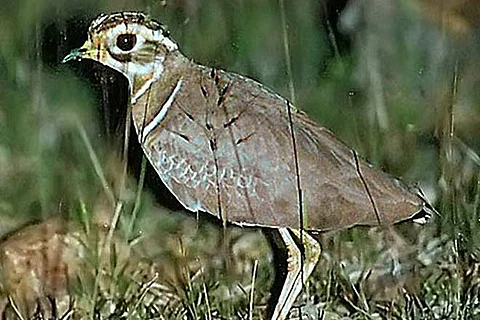

The Jerdon&rsquos Courser, one of the world&rsquos rarest birds, is no stranger to ecological isolation. Highly elusive and nocturnal, so far it&rsquos only been found in the dry scrub forests of Andhra Pradesh &mdash along a single site of the Sri Lankamaleswara Wildlife Sanctuary. Now this bird&rsquos dedicated sanctuary has been slapped with plans from the irrigation department to construct the Telugu-Ganga canal. After initial negotiations with the forest department and state government, the canal was shifted. But as work resumed recently, close to the sanctuary&rsquos eastern side, 22 cubic hectares of this birdland will be destroyed.
With the Jerdon&rsquos Courser population estimated at about 30 birds, what&rsquos also at stake here is unknown and unexplored biogeography that connects India with Africa. &ldquoThe Jerdon&rsquos Courser is one of India&rsquos relictual species, whose co-generics are found only in Africa,&rdquo says Dr Bharat Bhushan, who rediscovered the Jerdon&rsquos Courser in 1986. This &lsquowinged enigma&rsquo was first brought to science by Dr Thomas Claverhill Jerdon in 1848. When stationed with the Madras Regiment as Surgeon-Major he recorded the species in &ldquothe hilly country above the Eastern Ghats, off Nellore and in Cuddapah&rdquo. This was followed by Howard Campbell&rsquos &ldquopresumably authentic sighting&rdquo in 1900. Since 1986, Dr Bhushan, professor, environmental planning at Pune&rsquos Centre for Environment and Development, has been trying to study the biology of this double-banded bird via Africa where the three-banded courser nests among stones and half-buries its eggs in dung. But almost 20 years after &ldquothe world changed&rdquo for Dr Bhushan, when he saw a &ldquoquiet looking bird lift its head from a trapper&rsquos hand&rdquo, which he compared with a plate in Salim Ali&rsquos book, no one has been able to find a nest of the courser. As axes fall on the thorny trees around the sanctuary, perhaps we&rsquoll never see the secret strut of this kalivikodi, the bird that prefers to walk rather than fly. And, as this lost and found story is forced to a conclusion, we&rsquod do well to recall a universal truth &mdash that extinction is forever. To prevent this, the irrigation department needs only to shift the Telegu-Ganga canal, so these forests will still echo with the sharp peep of this species.
